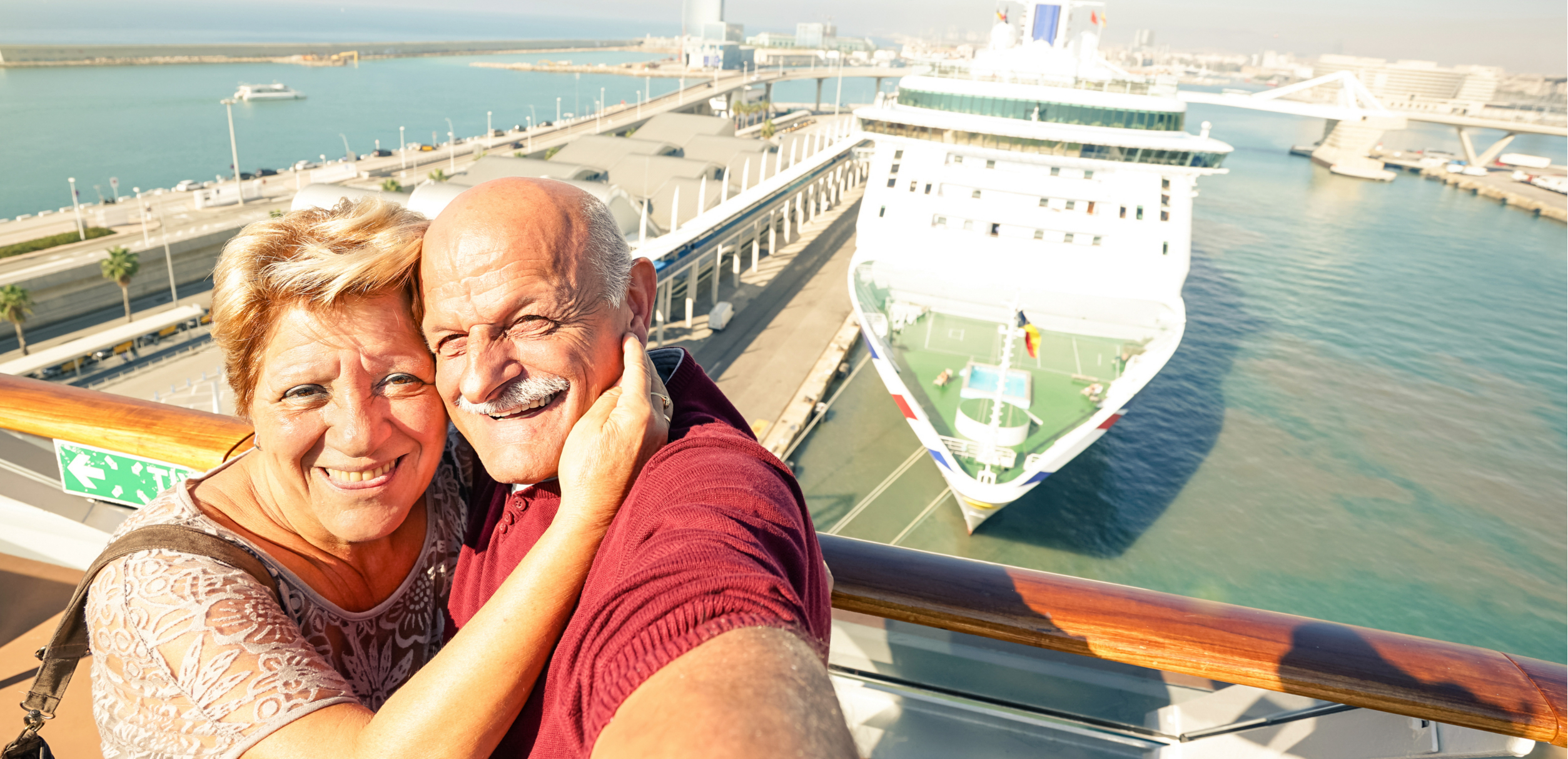Cruises for Seniors: Choose Your Perfect Sailing Adventure

When it comes to cruises for seniors, options are plentiful—from all-inclusive ocean cruises to tranquil riverboat voyages. If a sailing adventure sounds good to you, this might be the perfect time to take the plunge and book a cruise.
Here are some insights into different types of cruise vacations:
Ocean cruises for seniors
For retirees looking to break away from air and hotel travel, an ocean cruise offers the romance of the open seas. Imagine dancing the night away under elegant ballroom lights, or taking an evening stroll along the deck.
Ocean-liner travel provides a self-contained, hotel-like atmosphere, with the added benefit of port stops and ocean views. Travelers can catch a Vegas-style dinner show or try their luck in the onboard casinos. Moreover, dining options abound, complete with multiple buffets and a variety of restaurant options.
If you like the thought of sailing the open seas, mingling with vast numbers of guests, and indulging in a plethora of onboard amenities, then an ocean cruise might be the right choice.
Where do you want to go?
Maybe you’d like to cruise through the South Pacific with stops at tropical islands such as Tahiti and Fiji. Alternatively, maybe you’d like to zig-zag your way down the Atlantic coast, starting with the moderate summer climate of Montreal and ending in the balmy temperatures of Miami.
Wherever you go, you’re sure to enjoy all the comforts and excitement onboard and at your destination.
River cruises
If expansive oceans and hotel-like ships are not your speed, you may find a river cruise more appealing. Due to the vessel’s size, river cruises generally accommodate fewer people. This creates an intimate setting as the slender boats wend along the tranquil waterways (travelers susceptible to motion-sickness find the calmer water travel more appealing!).
Unlike self-contained ocean cruises, river cruise amenities tend to be simpler, offering set dining times (breakfast, lunch, and dinner) and smaller staterooms.
While there may be some onboard entertainment, the main attraction is the views. Passengers can relax on deck as they take in the ever-changing landscape.
River cruises for seniors are also destination-oriented. Travelers stop at a port each day (sometimes more) where they can explore the sites, before embarking again for their next destination. The experience—from accommodations to port activities—will vary depending on where you’re traveling and the type of vessel.
European riverboat cruises are popular with retirees, including voyages along some of Europe’s most famous rivers.
For example, a Rhine River cruise will wind through Switzerland, Austria, Germany, France, and the Netherlands. Guests have the opportunity to explore the cobblestone streets of medieval villages, sip wine in old-growth vineyards, and wander through breathtaking cathedrals.
Another European waterway cruise includes France’s Seine, providing sightseeing opportunities in Paris and the Normandy region. Also, a Rhone River voyage takes visitors deep into Provence’s wine country before reaching the Mediterranean near Marseille (home of Bouillabaisse—the Marseille fisherman’s stew made with local fish and served with bread and rouille, a Mediterranean olive oil, garlic, and saffron sauce).
Before you book a cruise, keep these things in mind:
Disabilities accommodations
For seniors with disabilities, cruise vessels may or may not be able to meet your needs. That includes wheelchair access across gangplanks, through stateroom doorways, and into showers.
U.S. cruise ships (as well as foreign-flag ships sailing in U.S. waters) should provide accommodations under the Americans with Disabilities Act (ADA). However, cruise ships fall into a grey area for meeting standards.
Before signing up for a cruise, read the company’s customer reviews regarding the boat’s modifications for disabled people. Also, ask your booking agent to check on accommodations for your specific needs (e.g., Braille signage for sight impairment or ASL interpreters for the hearing impaired).
If you’re considering an international river cruise, disability accommodations may be limited—such as wheelchair access. If you have a disability, talk to your booking agent to ensure your needs will be met (including embarking and disembarking across adjacent vessels’ gangplanks during port visits).
Cruise travel insurance
Making travel insurance part of your cruise plans is a smart move. While cruise ships provide medical services, treatments are limited. Should you have to be hospitalized at a land-based hospital or airlifted off the vessel, you will be responsible for any expenses. Research cruise travel insurance options early in your trip planning to find coverage that best fits your needs.
Note: While there are some coverage exceptions, Medicare will not provide healthcare coverage while you’re on a cruise.
Get ready to embark on your next adventure
Ocean and river voyages attract travelers the world over. Maybe it’s the moonlight on the open sea, lighting the way beyond the horizon or an immense centuries-old castle appearing around the river bend.
Whether you choose an ocean liner or an intimate river barge for your cruise travel, with a little planning, you’re sure to create some wonderful sailing memories. Bon voyage!
Be a smart traveler! Make trip protection a priority.
A common regret is not getting money back should you have to cancel or cut-short your vacation.
Get a FREE quote today from our Seven Corners travel insurance partner.

